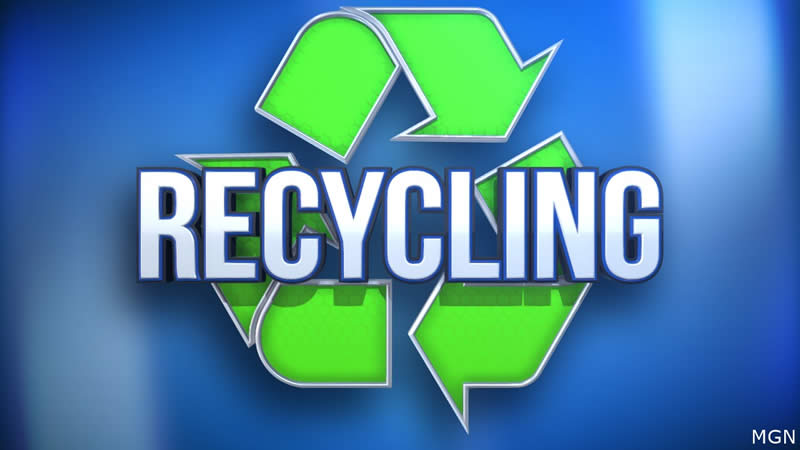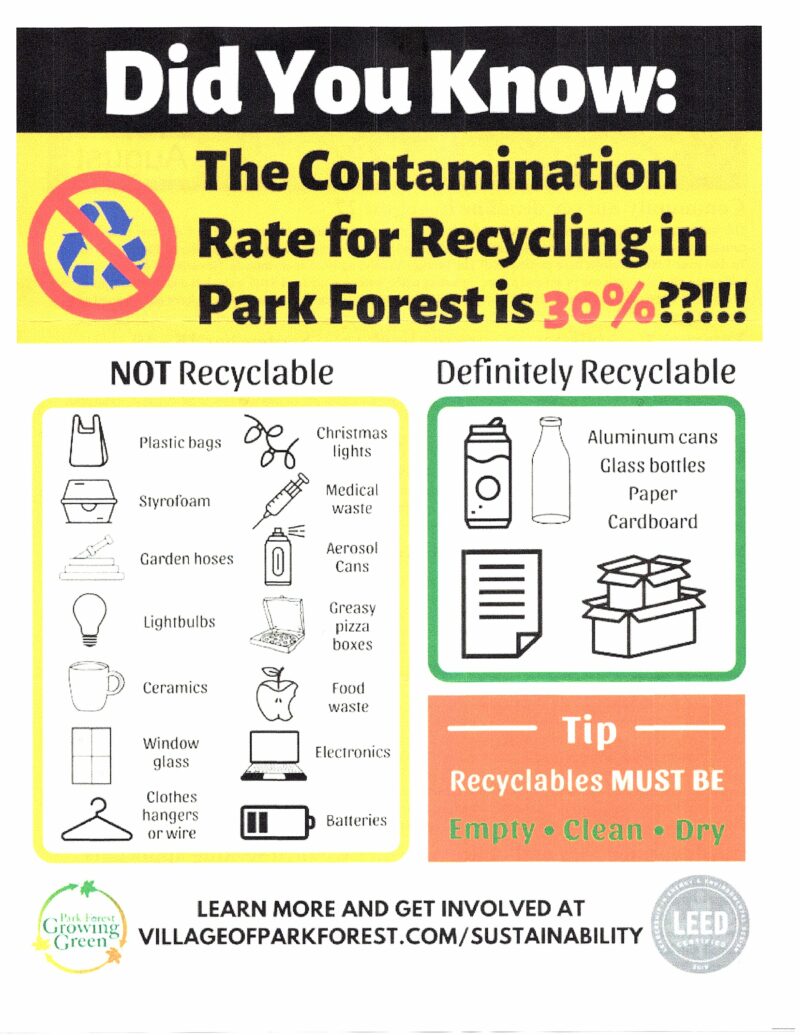
Park Forest, IL-(ENEWSPF)- In August, Park Forest residents received a water bill insert noting that the village currently has a 30% recycling contamination rate. This number, provided by Homewood Disposal, which services the village, refers to the fact that 30% of the items placed in the green recycling bins for biweekly pickup cannot be recycled.

Homewood Disposal Municipal Affairs Manager Frank Hillegonds recently informed eNews Park Forest that the 30% figure reflects the company’s total operation and that the Park Forest contamination rate is closer to 22% to 25%. Nonetheless, even that level of contamination makes effective recycling a difficult process.
What You Can Do To Decrease Recycling Contamination
Village of Park Forest Sustainment Coordinator Carrie Malfeo is promoting a new recycling campaign “The 5 Rs of Waste,” which she hopes will help drive that contamination rate even lower.
The 5 Rs of Waste campaign stresses that the best way to help recycling efforts avoid waste is by not creating it in the first place. For example, residents should avoid the hard plastic take-out utensils given by restaurants which typically cannot be recycled. Also, personal levels of consumption can be reduced by buying higher quality products that last longer or reuse existing products by trading with friends or donating unneeded items. Residents are reminded to always recycle paper, glass, metal, and plastic items accepted by Homewood Disposal. Finally, composted food scraps can be used to nourish gardens and flowerbeds.
According to a recent United Nations report, only 9% of the world’s plastic waste produced to date has been recycled. Malfeo hopes that by educating residents about which products can be recycled, the contamination rate can be driven down, and the successful recycling rate increased.
Hillegonds stated that the primary contributors of contamination are the empty plastic bags and plastic bags filled with trash placed in the recycling bins. The plastic bags, referred to in the recycling trade as “tanglers,” get caught in the sorting machinery causing the process to stop while the bags are manually extracted. Recyclables should never be placed in plastic bags but should be kept loose in the recycling cart. Plastic bags can be recycled at collection points found in many grocery stores including Mariano’s, Jewel, Food 4 Less, Meijer, and Pete’s Fresh Market. Numerous cities across the country such as Los Angeles, Chicago, and Boston, have banned the use of single-use plastic bags or imposed a surcharge to limit their use due to the detrimental impact on the recycling process.
Other tanglers with the same negative impact on effective recycling are Christmas tree lights, clothing, and wire clothes hangers — none of which are allowed in the Park Forest bi-weekly recycling pick-up.
Residents are encouraged to drop off Christmas tree lights at designated village drop-off locations available after the holidays. Clothes, if usable, can be donated to charitable organizations, and clothes hangers can sometimes be returned for reuse to the store where they were obtained.
The Economics of Recycling Have Changed
Hillegonds noted that the economic advantages involved in recycling have declined significantly over the past several years. Prior to 2013, a high percentage of the country’s recycled material was sold to China. However, much of this material was highly contaminated with materials that could not be recycled. As a result, China enacted the “Green Fence” policy limiting how much recycling would be accepted from the United States. China warned that it would stop accepting recycling waste if contamination levels did not improve. In 2018, the “National Sword Policy” was enacted by China, banning recycled materials from America because the contamination rate continued to be unacceptably high. In 2019, India followed China’s lead and banned the importation of recycled plastic material.
According to Recycle Across America, a nonprofit organization dedicated to improving the level of recycling, many US-based recycling plants have gone out of business because of the high cost of handling contaminated waste materials.
As a result, the cost of recycling has become more expensive, which translates to higher prices for haulers and end-users. Consequently, the need to reduce contamination rates has become even more important from both an economic and environmental perspective.








